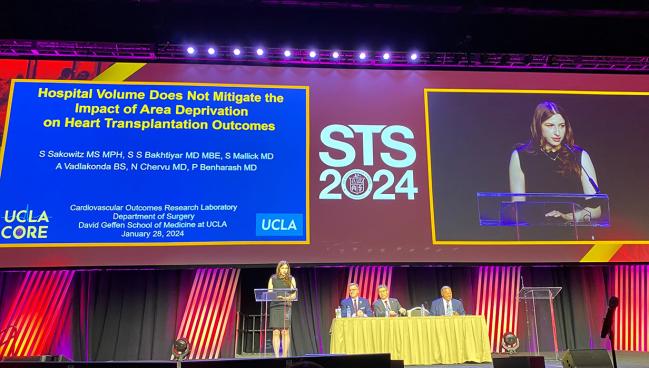Where You Live Matters More Than Hospital Volume for Heart Transplant Outcomes
People who live in poorer areas see higher mortality and more graft failure—it’s time to reduce inequities, says Sara Sakowitz.

SAN ANTONIO, TX—Heart transplant recipients who live in poorer neighborhoods are at greater risk of mortality and graft failure after hospital discharge out to 5 years, according to new registry data. Treatment at high-volume centers does not seem to mitigate these inequities.
The findings don’t mean that where a patient receives their transplant doesn’t matter, say researchers, but rather that the drivers of unequal outcomes don’t stop there.
“Opening the door to higher-quality care and higher-volume hospitals isn't the ‘end all be all’ of mitigating disparities in transplantation,” said lead investigator Sara Sakowitz, MS, MPH (UCLA Geffen School of Medicine, Los Angeles, CA). “One of the significant underlying causes of such disparity appears to stem from engagement with longitudinal follow-up, access to immunosuppressive medications, and the care that needs to happen in the days, weeks, months, and years following discharge.”
Socioeconomic disparities in heart transplantation have been well documented, from barriers to getting on the waiting list to outcomes differences based on where the operation took place.
“The goal of this study was to look at disparities within the realm of heart transplantation outcomes that are almost a step beyond individual factors, that actually stem from community-level disparities, community-level structural barriers,” Sakowitz, who presented these data at the 2024 Society of Thoracic Surgeons meeting, told TCTMD. “I don't think we were fully surprised [by our findings], but we were surprised by the extent.”
Robert Higgins, MD (Massachusetts General Hospital, Boston), who discussed the study during the session, agreed. “Transplantation at a high-volume center doesn’t fix the problem,” he said. “The analysis really highlights that patients who undergo transplantation require a complex, well-organized, and technically sophisticated level of care and area socioeconomic disadvantage is independently associated with inferior survival.”
Additionally, he said, “these outcomes further highlight the failure of our entire system in addressing the broader healthcare disparities in lower-resource communities and populations, even when we provide the best we can do in heart transplant and advanced heart failure care. It's obvious that further efforts are needed to increase engagement with longitudinal follow-up care and addressing some of those systemic root causes of poor outcomes.”
High Volume Doesn’t Overcome Deprivation
For the study, Sakowitz and colleagues looked at data from the Organ Procurement and Transplantation Network on 38,675 adult patients who received heart transplants in the United States between 2005 and 2022. Using the area deprivation index (ADI), which measures zip code-level socioeconomic distress, they defined 20% as deprived. These patients were slightly younger, were more often Black, and were less often listed as UNOS status 1a.
Compared with those in less-deprived neighborhoods, those considered most deprived saw lower survival rates at both 1 year (90% vs 91%; adjusted HR 1.10; P = 0.03) and 5 years (77% vs 79%; adjusted HR 1.13; P < 0.001). Allograft survival at 5 years also was lower for the most-deprived cohort (77% vs 80%; adjusted HR 1.13; P < 0.001).
When the analysis was limited to patients treated at high-volume centers (≥ 21 transplants per year), there was no difference observed in 1-year survival between the groups, but at 5 years both overall survival (78% vs 80%; HR 1.11; P = 0.001) and allograft survival (78% vs 80%; HR 1.10; P = 0.001) remained higher for patients living in less-deprived areas.
Notably, graft failure was more likely to be the cause of death among patients from the most-deprived areas compared with those from less-deprived areas (P = 0.004).
We need to take this large-scale problem and identify small inflection points that we can change along the way. Sara Sakowitz
The problems explored in this analyses won’t have “easy” fixes, Sakowitz said, but “I do think it gives us a new goal to work toward to say, ‘Okay, what can we do to make sure that patients of any neighborhood, any community, any socioeconomic status have access to the right clinicians, the right medicines that they need, and the right checkups to make sure they are where they need to be in their transplantation journey?’”
In a world with limited funding, she urged clinicians to do what they can with what is already available. For example, education materials for heart transplant candidates must be designed to match patients’ health literacy levels, so “that we are communicating the messages we need to communicate and ensure those messages will be received, in particular regarding the importance of immunosuppression maintenance and long-term follow-up care.” Telehealth can also be used better to improve follow-up care, especially for patients with transportation or other economic barriers that prevent them from getting to appointments or taking their medications, Sakowitz suggested.
Importantly, the Immuno Bill stands out as an example of what can be done through advocacy, she pointed out. The legislation, which guarantees immunosuppression medications to kidney transplant patients, only became law in 2020 after decades of work. “Transplant programs need to join together to fight for a bill for heart transplant patients,” Sakowitz said. “There's no reason why heart transplant patients need to spend $3,000-$5,000 a month for immunosuppressive medications when together we can fight for something for all patients.”
Ultimately, the problems might seem large and untenable, but “when we think about systemic barriers to care, systemic issues in healthcare, we need to start somewhere. We need to take this large-scale problem and identify small inflection points that we can change along the way,” Sakowitz said.
Yael L. Maxwell is Senior Medical Journalist for TCTMD and Section Editor of TCTMD's Fellows Forum. She served as the inaugural…
Read Full BioSources
Sakowitz S. Hospital volume does not mitigate the impact of area deprivation on heart transplantation outcomes. Presented at: STS 2024. January 28, 2024. San Antonio, TX.
Disclosures
- Sakowitz and Higgins report no relevant conflicts of interest.





Comments